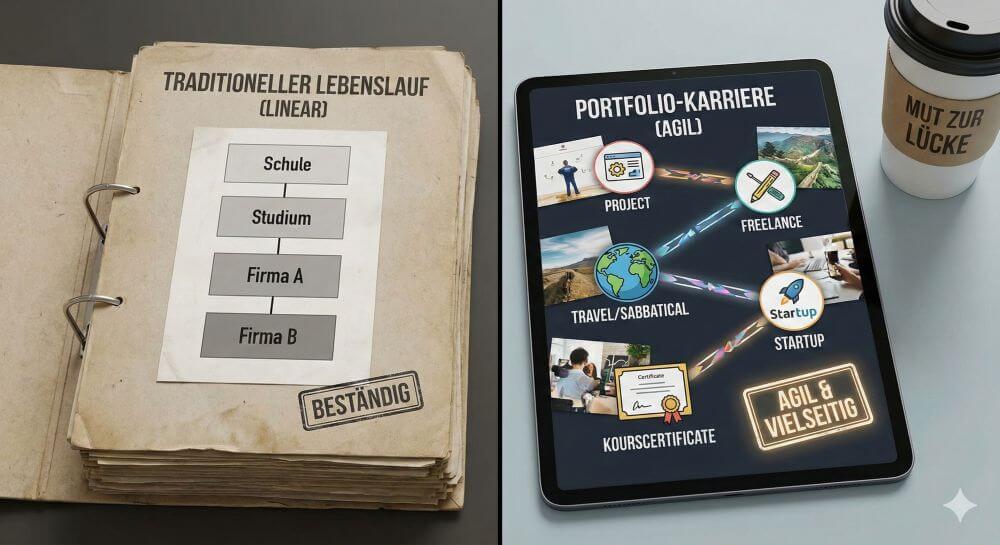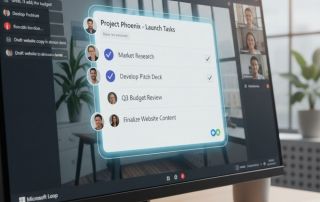From “gap” to agility: Why the zigzag resume is the future
For years, an unwritten rule prevailed in Germany: a resume had to be flawless, career progression linear, and loyalty to an employer almost lifelong. Those who “jumped the boat” were considered unstable. Those who took a break had to justify themselves. But this paradigm is crumbling. Welcome to the age of the portfolio career.
In a rapidly changing work environment, gaps in a career path are no longer seen as flaws, but increasingly as indicators of adaptability (agility) and courage.

The change: Why “straightforward” is outdated
The classic “chimney-climbing” career path—apprenticeship, entry-level position, advancement within the same company until retirement—rarely reflects the reality of the digital economy. Companies today need to be agile, and they seek employees who are just as agile.
A resume with numerous positions or periods of career change often signals:
- High willingness to learn: The candidate has familiarized themselves with various company cultures and software environments.
- Networking skills: Those who change jobs frequently know many people and perspectives.
- Resilience: Gaps in employment (e.g., due to sabbaticals, caregiving leave, or job loss) and successful re-entry demonstrate perseverance.
In the modern HR perspective, the “job hopper” becomes an “experience collector.” Versatility (generalist skills) is valued more highly than pure specialization.
Termination culture in the USA vs. Germany
To understand why we in Germany are still struggling with this change, a comparison with the USA is worthwhile. There, a fundamentally different mentality prevails regarding work and security.
Germany: Security as the Highest Value
Here, the employment contract is often a defining aspect of one’s identity. A dismissal – whether self-initiated or received – is often perceived as a personal failure or social insecurity. The stigma of the “gap” arises from the fear of losing status.
USA: “You’re Fired” Is Not the End of the World
In the USA, the labor market is extremely flexible due to “at-will employment.” Job security is practically nonexistent. This sounds harsh, but it has a downside that fosters innovation:
- Normalization: Since almost everyone gets fired or resigns at some point, there is hardly any stigma. It’s part of the “game.”
- Risk-taking: Those who fail get up and keep going. In the US, a founder who has failed with a company is often considered more experienced than one who never tried.
- Trial and error: US careers are often patchwork. People try things out. This mentality is slowly spreading to us: Failure is not a disgrace, but a source of data for the next success.
What exactly is a portfolio career?
The term goes beyond mere job-hopping. A true portfolio career means no longer making your labor available to just one employer, but rather diversifying your skills like an investment portfolio.
This can take various forms:
- The Slasher: Someone who works simultaneously as a consultant, author, and speaker.
- The Project Nomad: Works intensively on one project for 18 months, then takes a 3-month break, before starting the next project.
- The Hybrid: Part-time employee and part-time entrepreneur.
Important: In a portfolio career, the “gap” in your resume isn’t emptiness. It’s often time spent reinventing yourself, developing your skills, or simply recharging your batteries to give 100% in your next job.
Conclusion: Embrace the gaps
For applicants, this means: Don’t hide your gaps in your career path. Tell the story behind them. Explain what you learned during those “gaps” and why the change was necessary for your growth.
For companies, this means: Those seeking innovation shouldn’t be looking for perfectly polished resumes. The most exciting talent often comes from those with unique and unconventional profiles.
Beliebte Beiträge
Warum dein Excel-Kurs Zeitverschwendung ist – was du wirklich lernen solltest!
Hand aufs Herz: Wann hast du zuletzt eine komplexe Excel-Formel ohne Googeln getippt? Eben. KI schreibt heute den Code für dich. Erfahre, warum klassische Excel-Trainings veraltet sind und welche 3 modernen Skills deinen Marktwert im Büro jetzt massiv steigern.
Microsoft Loop in Teams: The revolution of your notes?
What exactly are these Loop components in Microsoft Teams? We'll show you how these "living mini-documents" can accelerate your teamwork. From dynamic agendas to shared, real-time checklists – discover practical use cases for your everyday work.
Career booster 2026: These Microsoft Office skills will take you further!
A new year, new career opportunities! But which Office skills will really be in demand in 2026? "Skilled use" is no longer enough. We'll show you today's must-haves – like advanced Excel, using AI in the office, and relevant certifications for your resume.
Excel Tutorial: How to quickly and safely remove duplicates
Duplicate entries in your Excel lists? This distorts your data. Our tutorial shows you, using a practical example, how to clean up your data in seconds with the "Remove Duplicates" function – whether you want to delete identical rows or just values in a column.
Dynamic ranges in Excel: OFFSET function
The OFFSET function in Excel creates a flexible reference. Instead of fixing =SUM(B5:B7), the function finds the range itself, e.g., for the "last 3 months". Ideal for dynamic charts or dashboards that grow automatically.
Mastering the INDIRECT function in Excel
The INDIRECT function in Excel converts text into a real reference. Instead of manually typing =January!E10, use =INDIRECT(A2 & "!E10"), where A2 contains 'January'. This allows you to easily create dynamic summaries for multiple worksheets.

































